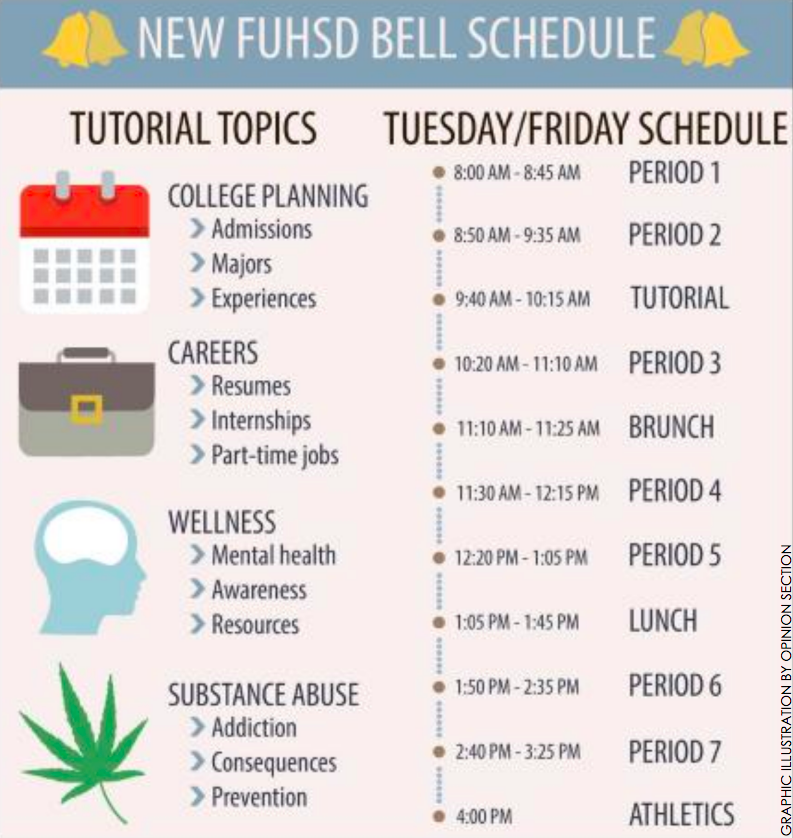Editorial: New bell schedule allows for better use of additional tutorial
The Voice of the Epic
January 25, 2018
To address concerns regarding student stress and sleep deprivation, the Wellness Taskforce assembled by FUHSD proposed new schedules for the 2018-19 school year. At Lynbrook, school will start at 8:00 a.m. at the earliest and end at 3:25 p.m. at the latest. The new schedule consists of two teacher collaboration periods per week instead of one, and three tutorials instead of two. The implementation of this new schedule should be used as an opportunity to improve student wellness at Lynbrook by making more effective use of tutorials and using teacher collaboration time to discuss the effects of homework on students.
“One of my concerns, when I was principal at Lynbrook, was looking at how hard our students worked and hearing stories from many kids about how much they struggled to complete homework, how much pressure they were putting on themselves and how much pressure they had from other students and parents,” said FUHSD Director of Stakeholder Engagement, member of the Wellness Taskforce and former Lynbrook principal John Dwyer. “We wanted to look at ways to make students’ lives better.”
The extra tutorial in the bell schedule also provides an opportunity for students to further connect with teachers. Students who miss class due to extracurricular commitments such as sports are given more chances to make up missed work.
“With three tutorials, we will have more time to develop relationships with teachers and get more academic and personal help,” said sophomore Catherine Huang. “Right now, we have two tutorials, but what if I need to ask a teacher something important on a non-tutorial day? If there are three tutorials, I will have more chances to do that.”
Lynbrook administrators have formed a committee of teachers to discuss how to help students make better use of tutorial. This committee discusses how students and teachers are currently using tutorials, what seems to be working well, what needs to be improved upon and different ways to make the most out of that time.
“We decided to form the teacher committee because we wanted to take a look at how we use tutorial now,” said principal Maria Jackson. “You only get one chance to start something the first time. With three tutorials, we have an opportunity to really look at how students can use them. ”
During these tutorials, teachers can support students both academically and personally. In addition to its current use of meeting with students, teachers might hold study sessions a few times a semester during tutorials to promote active student participation in smaller groups. Guidance counselors and the College & Career Center could also hold workshops for students to explore extracurricular activities and jobs. In order to provide students guidance on pertinent issues that are often under-discussed, such as mental health, time management, sleep hygiene, substance abuse and sex education, the school can invite guest speakers to educate students on these issues.
“If students are stressed, it’s important for them to talk to mentors such as teachers,” said junior Maithreyee Vatsan. “A lot of students need trusted adults to talk to.”
Because of the strong importance of issues relating to mental health, substance abuse and sex education, those workshops should be mandatory for students to attend but held only once or twice a semester. Academic and extracurricular information sessions should be optional but held more frequently and discuss a broad range of topics, from volunteer opportunities for underclassmen to advice for current seniors from Lynbrook alumni.
Excessive homework has also been a pervasive issue at Lynbrook for several years. Many community members have mentioned to the Wellness Taskforce that they did not believe a later start would result in students getting more sleep as long as the homework issue was not addressed.
“One of the things the Wellness Taskforce talked a lot about was that more work is not necessarily better,” said Dwyer. “It is generally agreed that the quality of instruction and the quality of learning is more important than the quantity of work students are doing.”
In regards to improving student wellness, small actions by teachers and administrators as well as logistical changes can make a difference based on student needs.
“Ultimately, I think teachers having compassion for and being sensitive to student needs is important,” said physical education and world history teacher Thomas Hammond. “It doesn’t hurt to shoot out a survey occasionally, find out what students need, what they are struggling with and then adapt your curriculum to suit their needs.”
Although Lynbrook students and staff members may find adjusting to the new schedule challenging, it is also a chance for students and staff to recognize the many factors that contribute to stress, and work to address these factors. This new schedule is an opportunity for Lynbrook to focus more actively on physical and mental wellness.



























































